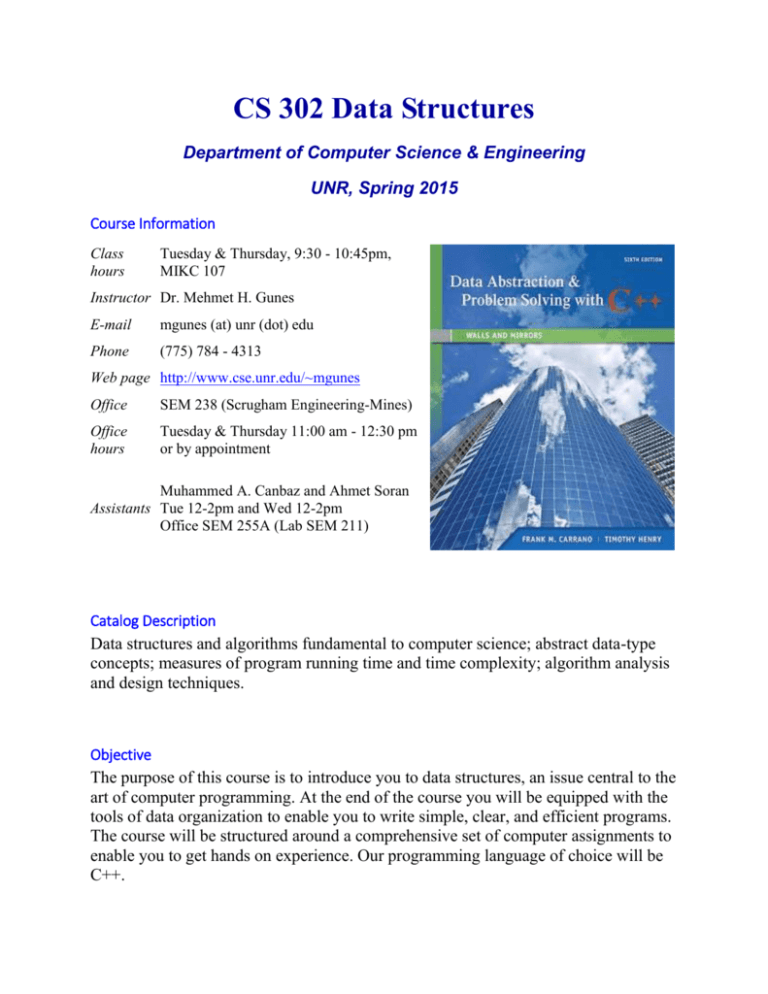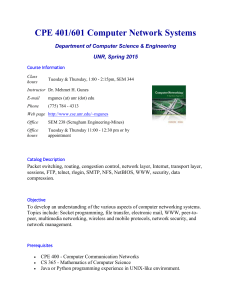CS 302 Data Structures
advertisement

CS 302 Data Structures Department of Computer Science & Engineering UNR, Spring 2015 Course Information Class hours Tuesday & Thursday, 9:30 - 10:45pm, MIKC 107 Instructor Dr. Mehmet H. Gunes E-mail mgunes (at) unr (dot) edu Phone (775) 784 - 4313 Web page http://www.cse.unr.edu/~mgunes Office SEM 238 (Scrugham Engineering-Mines) Office hours Tuesday & Thursday 11:00 am - 12:30 pm or by appointment Muhammed A. Canbaz and Ahmet Soran Assistants Tue 12-2pm and Wed 12-2pm Office SEM 255A (Lab SEM 211) Catalog Description Data structures and algorithms fundamental to computer science; abstract data-type concepts; measures of program running time and time complexity; algorithm analysis and design techniques. Objective The purpose of this course is to introduce you to data structures, an issue central to the art of computer programming. At the end of the course you will be equipped with the tools of data organization to enable you to write simple, clear, and efficient programs. The course will be structured around a comprehensive set of computer assignments to enable you to get hands on experience. Our programming language of choice will be C++. Prerequisites Prerequisite : C or above in CS 202 A good working knowledge of C++ programming up through recursion, dynamic memory and basic data structures such as stacks, queues, and linked lists. Textbooks Required Frank M. Carrano and Timothy Henry, "Data Abstraction & Problem Solving with C++", Prentice Hall; 6th edition. Recommended Setfan Brandle, Jonathan Geisler, James Roberge, David Whittington"C++ Data Structures: A Laboratory Course", Jones and Bartlett, 3rd edition Clifford A. Shaffer Data Structures and Algorithm Analysis, Dover Publications, 3rd edition. Thomas H. Cormen, Charles E. Leiserson, Ronald L. Rivest, and Clifford Stein, "Introduction To Algorithms", The MIT Press; 3rd edition. Reference Mark Allen Weiss, "Data Structures and Algorithm Analysis in C++ ", Prentice Hall, 3rd edition W. Ford and W. Topp, "Data Structures with C++", Prentice Hall, 2nd edition R. Kruse and A. Ryba "Data Structures and Program Design in C++ ", Prentice Hall M. Main and W. Savitch "Data Structures and Other Objects Using C++.", Prentice Hall, 4th edition Nell Dale, "C++ Plus Data Structures", Jones & Bartlett Learning; 5th edition. Syllabus (Tentative) This is a tentative list of topics, subject to modification and reorganization. Data Abstraction Recursion Array- and Link-Based Implementations Recursion as a Problem-Solving Technique Stacks Lists Algorithm Efficiency Sorting (Selection sort, Bubble sort, Insertion sort, Merge sort, Quick sort, Radix sort, Counting sort, Bucket sort) Queues and Priority Queues Trees (Binary Search Tree, Interval Tree, MDS Tree) Heaps (Heap ADT and Heap Sort) Dictionaries (Dictionary ADT, Hashing) Balanced Search Trees (2-3 Trees, 2-3-4 Trees, Red-Black Trees, AVL Trees) Graph (Breadth-first search, Depth-first search, Minimum Spanning Tree, Bellman-Ford shortest path, Dijkstra shortest path, Circuits) Processing Data in External Storage Organization Except this web page, all course materials will be posted at the WebCampus. Presentation slides will be available on the class web page. I will try to put them up before each class meeting but no guarantees on that. Class participation in terms of asking questions is highly encouraged. Please do not be afraid to ask questions no matter how simple you might think the answer could be. This type of interaction helps improve the effectiveness of the class and breaks the monotony. Students are encouraged to bring articles, demos, web pages, news events, etc. that are relevant to course topics to the attention of the instructor. The success of the course depends on everyone in the class engaging the material and bringing energy, enthusiasm, and intellect to class activities. Regular attendance is highly recommended. If you miss a class, you are responsible for all material covered or assigned in class. You should arrive on time and be prepared to discuss the session's topic. The underlying notion of the class is interaction, not passivity. Unless instructed otherwise, use of electronic devices including laptops are not allowed during lectures. Extra credit will be offered to the students who attend the departmental colloquia (an extra point for two colloquium attendance). You will be reminded in class about upcoming talks but you should also check the colloquia page on a regular basis (http://www.unr.edu/cse/get-involved/calendar). There will be 8 programming assignments. In the lectures, you will be introduced to data structures at an abstract level. In the assignments, you will write code to implement and use these data structures. Assignments will require turning in C/C++ code that compiles and runs properly, and a report documenting the code. Some of the programming assignments will be done in groups of two. When working with a partner, both team members are expected to fully understand the structure of the code and the implemented algorithms. Discussion of the programming assignments is allowed and encouraged. However, students are expected to do their own work. Assignments which are too similar or replicated from the Internet will receive a zero. Late assignments will be penalized by 20% per day, except holidays. We will be using the workstations in the College of Engineering Computing Center (SEM 231). Typically you will be asked to submit an electronic version of your code, and test runs, along with a folder with an appropriate write-up for your program. Every assignment must be completed, working, and turned in. There will be 5 points penalty for each missing programming assignment. Don't get behind in the programming assignments. Probably the main reason for students doing poorly in this course is getting behind in the assignments and never recovering. Design and implement in a top-down, modular fashion. Get something working that has the skeleton structure of what you need and then add features to it. Each time you add a feature, test it and make sure everything is still working. It can be tough to debug big programs if all you know is that the output is wrong and you are not sure any individual module is working. Online forums are set up in WebCampus to exchange ideas and provide tips. Active users will be given bonus points at the end of the semester. There will be 13 online quizzes given every Thursday. The lowest graded 2 will not affect your overall grade. Questions in these quizzes will be designed to give you an opportunity to test and affirm your knowledge for the week's material. There will be one midterm exam and one final exam. You should plan on taking the exams on the scheduled times. No late/early exams unless in case of an emergency situation such as health emergency or similar un-avoidable situations and you need to provide convincing documentation for it. The material covered in the exams will be drawn from the lectures, quizzes, and homework. The exams will be closed books and closed notes but a single page cheat sheet (double side letter size) is allowed. No calculators (unless otherwise stated) and no other computing devices should be used during the exam. Assignments and exams must be prepared strictly individually. You are welcome to discuss the problems or solution strategies with your class mates but the resulting work should be your own. Copying from each other or from other sources is considered as cheating. Any form of cheating such as plagiarism or ghostwriting will incur a severe penalty, usually failure in the course. Please refer to the UNR policy on Academic Standards. Surreptitious or covert video-taping of class or unauthorized audio recording of class is prohibited by law and by Board of Regents policy. This class maybe videotaped or audio recorded only with the written permission of the instructor. In order to accommodate students with disabilities, some students may have been given permission to record class lectures and discussions. Therefore, students should understand that their comments during class may be recorded. If you have a disability for which you will need to request accommodations, please contact the instructor or someone at the Disability Resource Center (Thompson Student Services - 101) as soon as possible. Academic Success Services: Your student fees cover usage of the Math Center (784-4433 or www.unr.edu/math-center), Tutoring Center (784-6030 or www.unr.edu/tutoring-center), and University Writing Center (784-6801 or www.unr.edu/writing-center). These centers support your classroom learning; it is your responsibility to take advantage of their services. Keep in mind that seeking help outside of class is the sign of a responsible and successful student. Grading (Tentative) Both grading policy and scale are subject to change. Failure in either the assignments or the tests will result in failure in the course. Grading Policy 50 - Programming Assignments (8) 11 - Quizzes (11 of 13) 19 - Midterm Exam 20 - Final Exams Grading Scale (Tentative) A : 87 - 100 B : 75 - 86 C : 63 - 74 D : 51 - 62 F : 0 - 50 (or caught cheating) Important Note: You will have one week to appeal for your grades after the graded assignments/tests are returned. So, please keep this in mind if you think that there is a problem/issue with the grading of your work. ABET Criteria The course outcomes are skills and abilities students should have acquired by the end of the course. These outcomes are defined in terms of the ABET Accreditation Criterion 3 Program Outcomes which are relevant to this course. Our graduates will have achieved: (3) an ability to design, implement, and evaluate a computer-based system, process, component, or program to meet desired needs, within realistic constraints specific to the field. (4) an ability to function effectively on multi-disciplinary teams. (7) an ability to communicate effectively with a range of audiences. (9) a recognition of the need for, and an ability to engage in continuing professional development and life-long learning. (10) a knowledge of contemporary issues.






